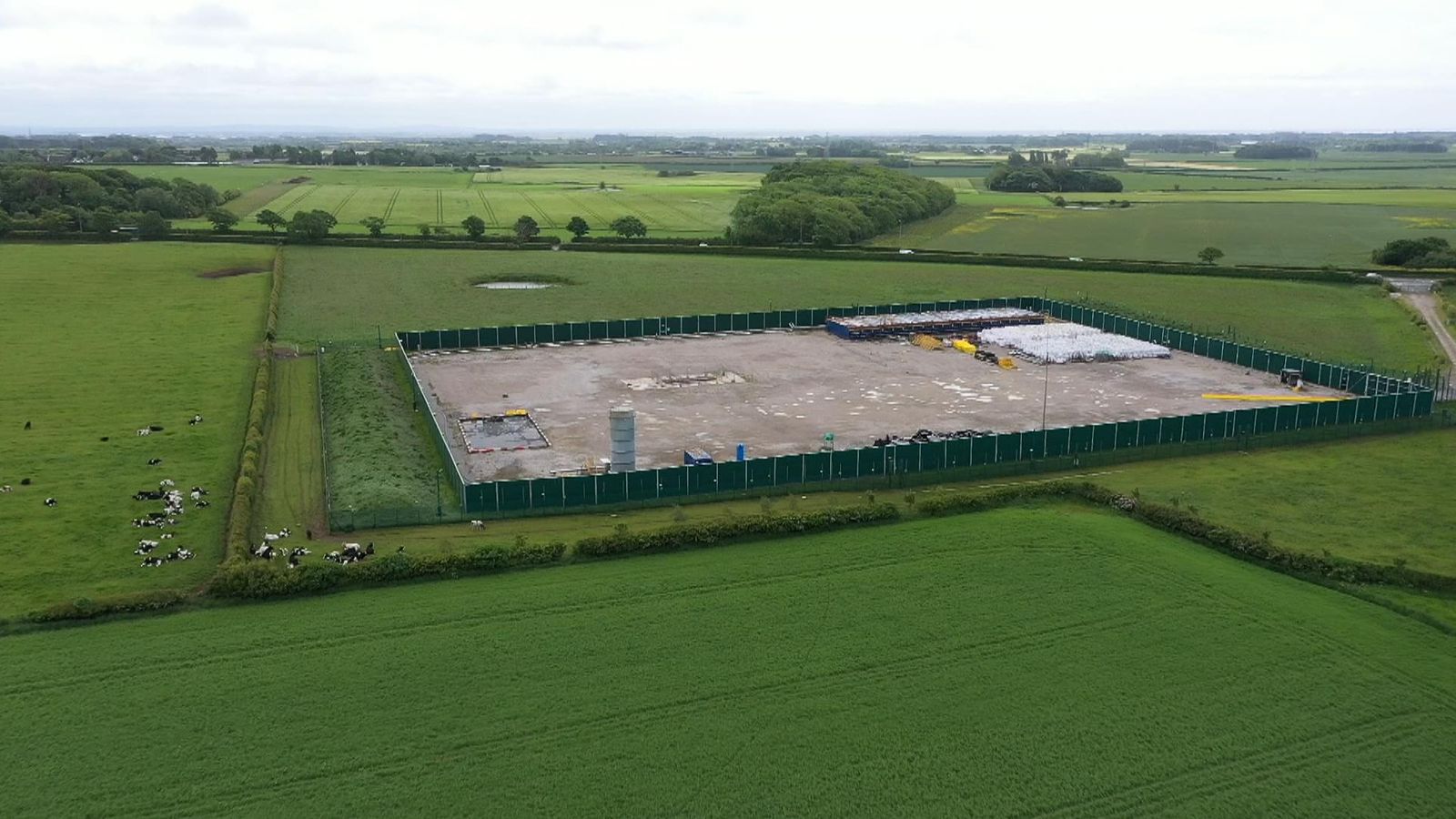A leading geologist who advised the government on fracking has told Sky News that in his view the UK “could have another go” at the controversial shale gas extraction method, which was suspended indefinitely in 2019 in the UK after exploratory drilling caused a series of earthquakes.
Professor Peter Styles said that it was “reasonable” for the government to have commissioned a review from the British Geological Survey (BGS) into whether fracking can be done more safely.
The BGS review focuses on whether there have been any new developments or techniques that could reduce the risk and magnitude of seismic events caused by fracking, and is due to be submitted to the government on Thursday.
Business Secretary Kwasi Kwarteng has said that given the energy crisis driven by Russia’s invasion of Ukraine, the government should keep “all possible energy generation and production methods on the table” but that his department would be led by the science on fracking and would only lift the moratorium if it were shown to be safe, sustainable, and of minimal disturbance to those living nearby.
Prof Styles said: “It may not work out that it is a plausible source of energy … but I think we should try to understand it, we should always try to understand these things.
“The more time we spend understanding the data, and actually having hard facts, the better it is, rather than just having supposition and decisions made on political grounds.”
Prof Styles helped to design what became known as the ‘traffic light system’ that set seismic thresholds within which the emerging fracking industry had to operate, and he has warned that drilling for shale gas in the UK is extremely complex due to both the geology of this country and the presence of old coal mines.
Ineos challenges government to allow it to try fracking in England
Energy crisis: U-turn as Cuadrilla’s UK fracking wells given stay of execution by regulator
Climate change: Cuadrilla ordered to plug and abandon shale gas fracking wells in Lancashire
But when asked if it was right to restart fracking in this country, he replied: “I think a few tests wouldn’t hurt.
“I think we could have another go, but I don’t know if we will.”
‘Very unsettling and unnerving’
Fracking is a contentious extraction method that can cause earthquakes and has historically had very low public support.
It involves drilling into shale rock deep underground and injecting a high-pressure mixture of water, gas and chemicals into the rock.
The shale then fractures, releasing the gas contained within it back up to the surface.
The energy company Cuadrilla has attempted exploratory drilling at two sites in Lancashire.
Work was stopped at both sites, once in 2011 and once in 2019 when an earthquake measuring 2.9 on the Richter scale led the government to intervene and suspended fracking indefinitely.
Local residents were relieved.
Chris and Susan Holliday live in Little Plumpton village in Lancashire.
Their house is nearly opposite Cuadrilla’s Preston New Road drill site, which is where the 2.9 magnitude earthquake happened.
Mr Holliday said: “We were in the kitchen when it happened and literally crockery in the cupboards was rattling, the windows were shaking.
“It’s very unsettling, it’s very unnerving, and very, very concerning that you’re living with this and in our case, just 500 or so metres away from our homes.
“It’s not what you want.”
‘People wouldn’t listen to us’
Fellow campaigner Barbara Richardson said: “It was hard at first because people wouldn’t listen to us. We were called all sorts of things; green blobs … all the insults.
“We were just normal people who saw the damage this industry would do and felt we had to challenge that.”
Anti-fracking activist Miranda Cox said: “It’s very disruptive, it’s a very divisive industry.
“The more you look into it, the more you learn about the industry and the impacts it has environmentally, socially and emotionally, I think people would realise that they wouldn’t want it, they wouldn’t want to live with it on their doorstep.”
But Cuadrilla chief executive Francis Egan points out that even the most ambitious climate change targets include using gas for decades to come.
In an interview, he told Sky News: “The shale gas industry in the UK has been frankly demonised.
“We have complied with every regulation. We have followed government policy, we are trying to extract a product that everybody in this country, virtually, uses.”
But his main grievance is that the fracking industry has been subjected to stricter seismicity thresholds than other comparable industries.
He said: “If fracking is unsafe, then construction is unsafe, mining is unsafe, and geothermal is certainly unsafe.
“So either one rule applies to all of them, the same rules, or if the government wants to shut fracking down on the grounds that it’s unsafe, then it needs to shut down the construction industry in the country.”
Several unknowns with fracking
If fracking were to restart, a significant proportion of the activity would happen in the north of England, home to what’s known as the Bowland Shale Formation, which stretches over a vast area from coast to coast.
But there is little certainty beyond that.
It is still not known how much gas is down there, the quality of that gas, or whether it is recoverable, and it is hard to answer those questions unless exploration begins,
Campaigners say that would be a disaster for climate change, at the very moment we should be accelerating investment in clean energy.
Friends of The Earth Spokesperson Jamie Peters said: “I think it’s been really well established why we shouldn’t be fracking.
“The ultimate reason is that we’re in a climate emergency. It’s shameful and incomprehensible to imagine a new fossil fuel industry.
“You can be for climate action or you can be for shale, but you can’t be both.”
There is little agreement on whether or not there is an economic case for fracking.
Professor Dieter Helm, who has advised the government on energy policy, warns that unlike America and its booming shale gas industry, fracking here doesn’t really add up.
He said: “If you go to the United States, you’ve got wide open plains, very low population density, uniform rock structures … so no real problem.
“Here in the UK, look at the geography, look down at how densely populated this country is, look at the complexity of the geology, think about what’s involved in getting the stuff out and getting it to market.
“It’s whether it’s economic, sensible, and, in a complex situation like the UK, whether it makes local environmental sense too – And my guess is, the answer is probably not.”
But energy economist from the Institute of Economic Affairs Andy Mayer argues differently.
He said: “We’re going to need oil and gas for the next 20 to 30 years at least, and possibly longer.
“The only question then is are we going to be getting from under our own feet, which is what fracking is all about? Or are we going to be getting it from abroad, importing it from places like Qatar, Saudi Arabia, and heaven forbid Russia?
“If we’re doing that, what’s happening is that we are shipping away all the opportunity that comes from the oil and gas industry to other places and paying their taxes.”
No ‘downsides for the British public’
Fracking has also become an intensively political issue.
Craig Mackinlay is chairman of the Net Zero Scrutiny Group, a collection of Conservative MPs pushing back against the government’s climate targets.
He said: “With shale gas extraction will come a lot of investment, a lot of jobs, a lot of tax revenue for the Treasury, we need that.
“There won’t be any government money, this would be private money, you know, big corporations.
“If it works, it works – good luck to them. If it doesn’t, they’ve made an investment that’s failed. I don’t see any downsides for the British public – only an upside if it works.”
“If we have it under our feet, then for heaven’s sake let’s use that.”
Follow the Daily podcast on Apple Podcasts, Google Podcasts, Spotify, Spreaker
But Mark Menzies, whose Lancashire constituency Fylde bore the brunt of the first attempts at drilling has had enough of the fracking industry.
He said: I’m afraid they’ve lost their license to operate as far as I’m concerned.
“I certainly don’t trust them.”
“The government would be wrongheaded to press the green light on Preston New Road again. Two national moratoriums speak volumes.”
Labour’s shadow minister for climate Olivia Blake said: “It’s a waste of time, energy, effort, money, even to do this review.
“I think that we could be really focusing on the here and now, fixing the cost of living crisis, improving our energy security through renewables and making sure that we’re actually focusing on what people want.”












